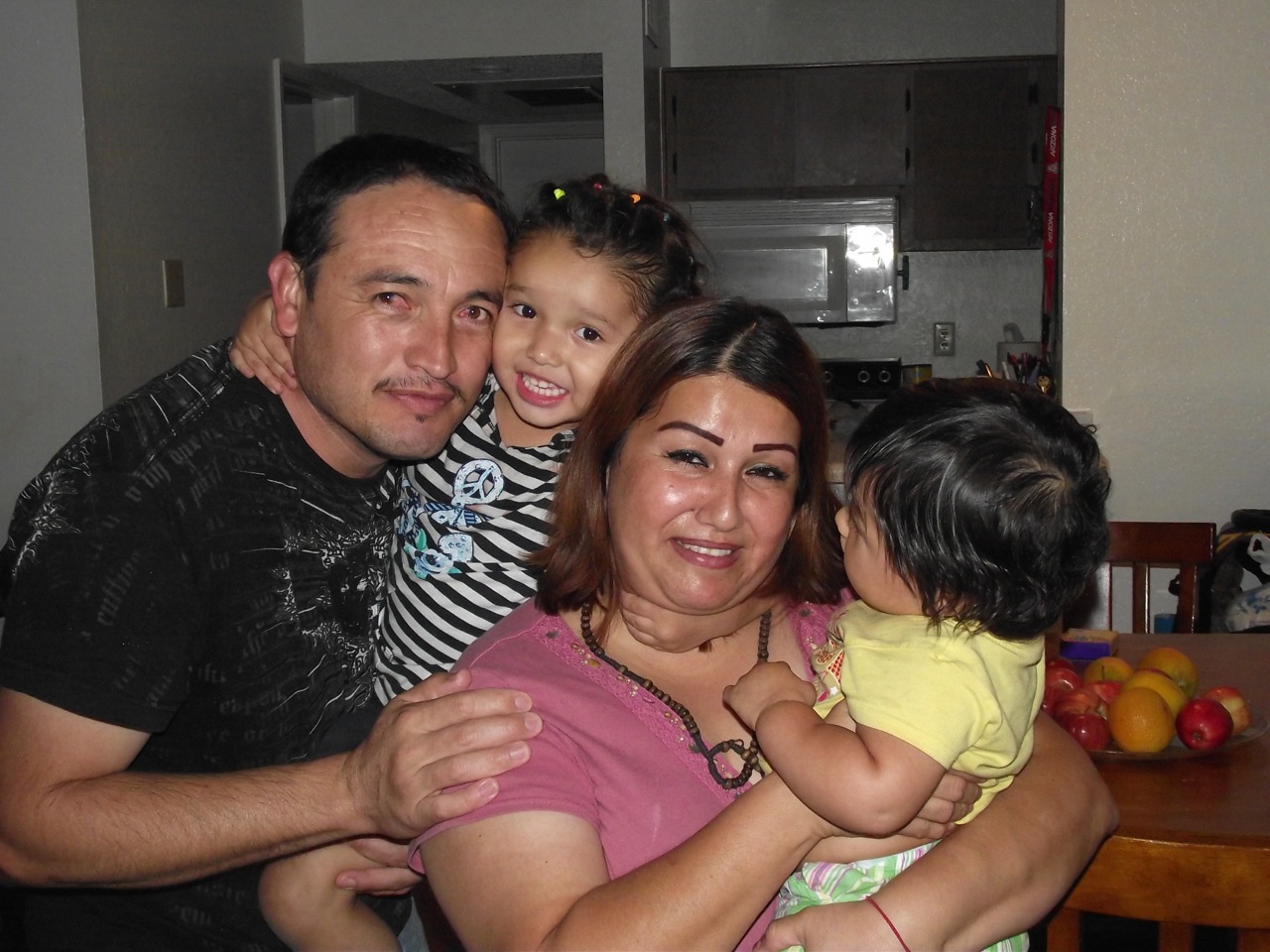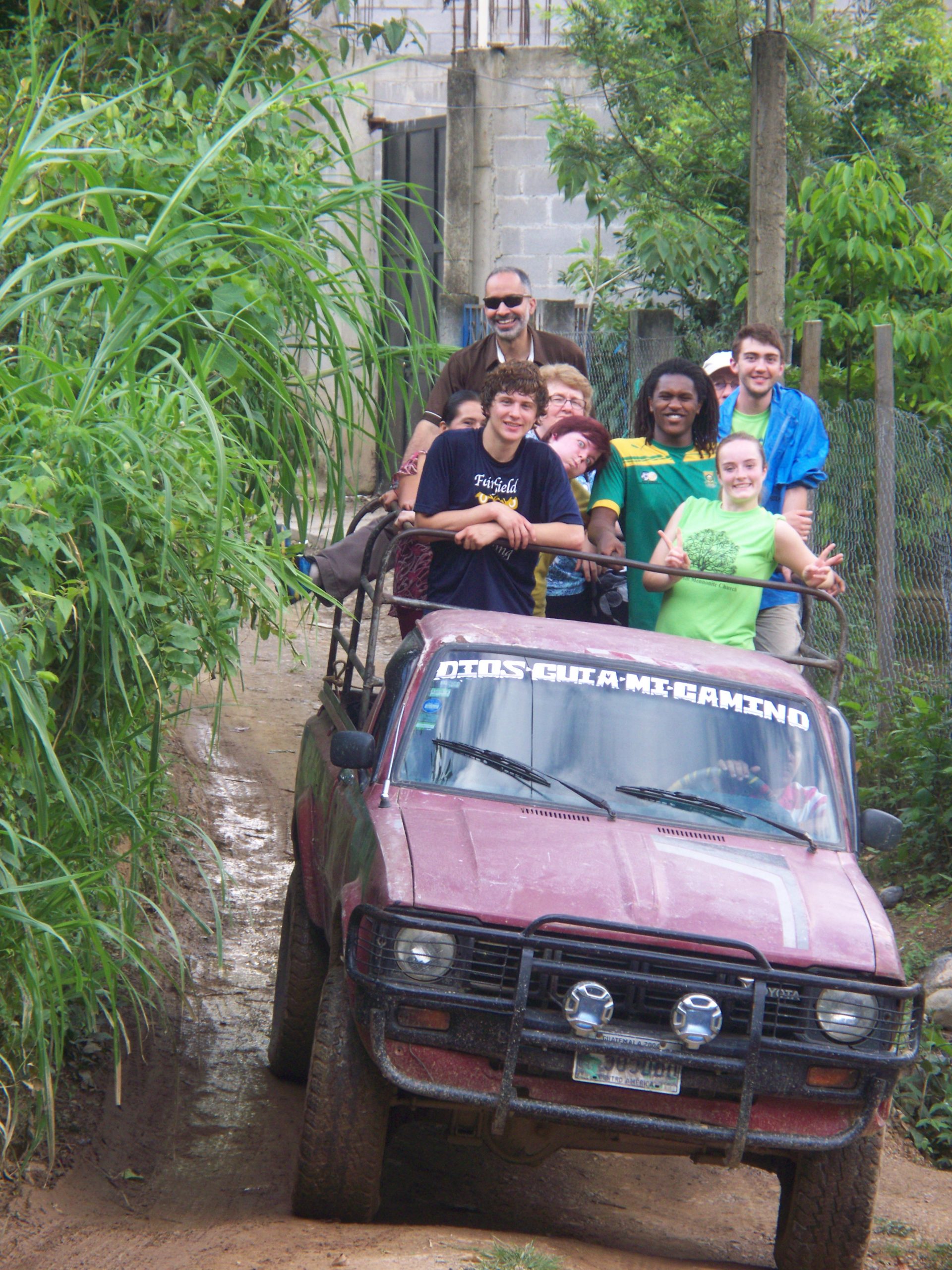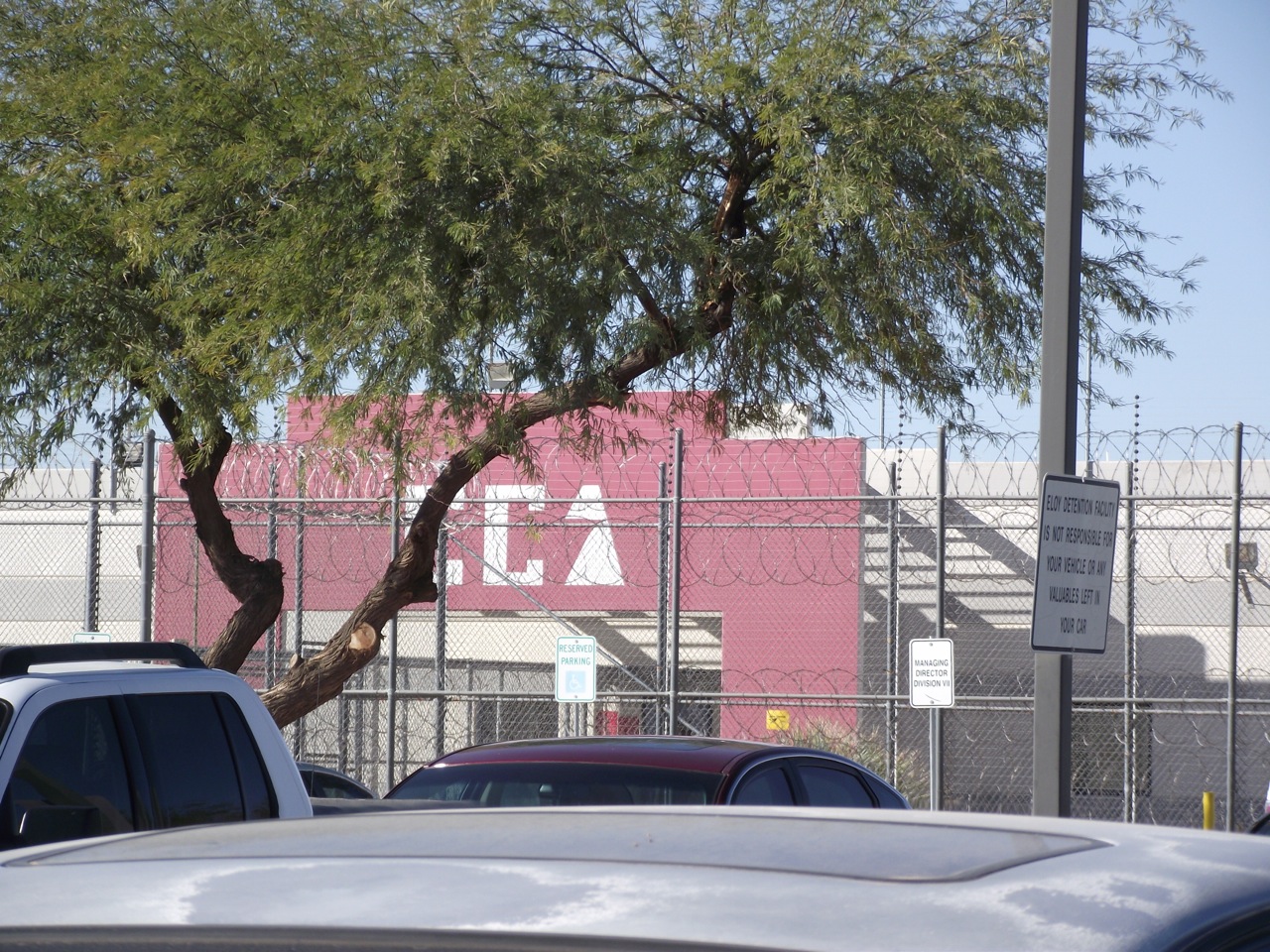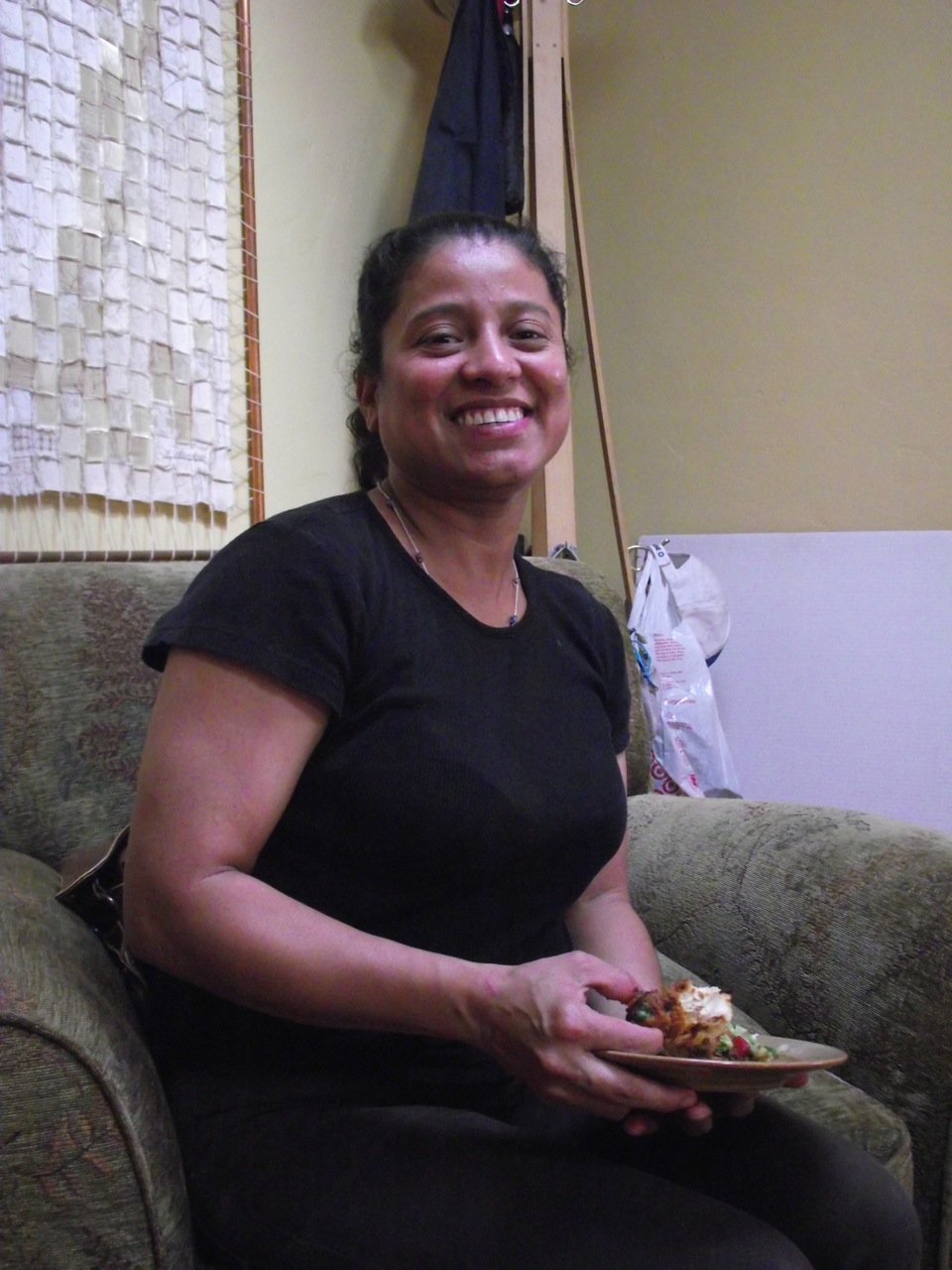[Español]
By Ardell Stauffer
(Mennonite Church USA)—Sometimes one day can change your life. Youth from Walnut Hill Mennonite Church, Goshen, Ind., chose to participate in a one-day learning trip to the U.S.-Mexico border while attending Mennonite Church USA’s biennial convention in Phoenix in July 2013. Convention planners had organized the learning trips—led by the BorderLinks organization—as part of an overall focus on immigration during the gathering.

Raúl (not his real name), a detainee from Mexico released on bond paid by Evanston (Ill.) Mennonite Church after 10 months of imprisonment, and his family. (Photo provided by Tina Stoltzfus Schlabach)
“It was the first time most of our youth had engaged immigrants first hand,” says youth sponsor Jason Harrison.
Since then their choice has led them to America’s largest immigration detention center in rural southwest Georgia. It took them to Guatemala to meet U.S. immigrants’ families. They started an intergenerational Sunday school class to talk about immigration issues. Upcoming plans include a visit to an immigration detention center near Chicago and perhaps discussions with area politicians about immigration.
During the learning trip, the Walnut Hill youth group and their sponsors heard firsthand stories of divided families, detention and hardship. They watched the U.S. court system try 70 Spanish-speaking men in English, 10 at a time, in a confusing courtroom setting.
Three of the Walnut Hill youth spoke about their BorderLinks experiences to assembled Mennonite Church USA delegates who were considering an immigration resolution at the convention.
At a convention workshop later in the week on immigrant justice and Christian hospitality, the Walnut Hill youth met presenter Anton Flores-Maisonet, cofounder of Alterna, a Christian cross-border outreach community in LaGrange, Ga. From that contact, the Walnut Hill congregation chose a group of youth and adults to visit Stewart Detention Center in Lumpkin, Ga., as their 2014 annual Sharing and Learning Together trip at spring break.

Youth and adults from Walnut Hill Mennonite Church in Goshen, Ind., traveled to Guatemala in the summer of 2014, where they met and stayed with families of detainees they had met on a trip to Georgia. Pictured (left to right) are Katja Norton, Jason Harrison, Trever Yoder, Ian Bomberger, Nathanael Eby, Liz Yoder, Bekah Schrag and Anton Flores-Maisonet in El Sauce, Guatemala. (Photo provided by Jason Harrison)
At Stewart, youth and adults spoke by phone through heavy prison glass to imprisoned detainees. They learned about for-profit detention centers like Stewart that make money for the individual and corporate owners, and where extended detention instead of deportation means profit from government contracts.
The warm hospitality of immigrant families in Georgia impressed the group members, who stayed in homes. In June, another group of Walnut Hill youth and adults visited Guatemala, where they met and stayed with families of some Georgia detainees.
Again the theme was hospitality, says Harrison: “Compared to the lack of hospitality most immigrants experience in the United States, it felt like a divide that was unfair and unjust.”
Walnut Hill youth brought their concerns home to their church, where after each of their trips they led a worship service. The congregation started an intergenerational Sunday school class using Mennonite Church USA’s Radical Hospitality curriculum. An immigrant couple from Mexico joined the class and now attend the church.
Trip participants kept returning to the story of the Good Samaritan, Harrison says. “How do we respond to those in need? Which character are we in the story? Are we those who need help?”
One graduating senior from Walnut Hill changed his life choices based on his experiences, Harrison reported. Delaying college, the young man has gone to South Africa as part of Mennonite Mission Network’s one-year Radical Journey program.
“It’s been quite a ride in just 18 months,” says Harrison. “A whole lot has come out of a decision to go on a one-day learning experience in Tucson.”
Welcoming the stranger

A for-profit detention center, Corporate Corrections of America, one of the private detention centers that Immigration and Customs Enforcement (ICE) subcontracts to for immigration “beds.” The U.S. Congress currently mandates that 34,000 beds/places continuously be paid for in immigration detention centers. (Photo provided by Tina Stoltzfus Schlabach)
As immigration issues have headlined news in the past year, other Mennonite congregations have responded, too, reports Tina Stoltzfus Schlabach, a member of Shalom Mennonite Fellowship in Tucson. Schlabach, a pastor credentialed by Mennonite Church USA, visits women held in detention and offers spiritual direction.
Schlabach says that thousands of women and young children—mostly from Guatemala—have crossed the border since 2013, traveling by bus to family members waiting to receive them in Florida, New York, Ohio, California and other destinations. Some are released by Immigration and Customs Enforcement and dropped off at local Greyhound stations across southern Arizona and Texas. Humanitarian groups from these communities have organized to welcome them, offering food, hydration and orientation before they begin their long trips to their families.
Peace Mennonite Church of Dallas, Texas, and Hyattsville (Md.) Mennonite Church put together hundreds of kits with drawing paper, crayons and small toys for the children.
“The children are so excited to receive these bags made just for them,” Schlabach says.
Members of Evanston (Ill.) Mennonite Church felt called to act as well.
“We sold our building over five years ago and had slowly been trying to figure out what to do with the money,” says Pastor Mitchell Brown. The congregation chose to bond out two imprisoned detainees.
“It is often impossible for migrant families to raise bond,” says Schlabach, noting that detainee bonds are often set from $5,000 to $15,000. When bond is granted and paid, immigrants can continue to fight deportation outside of detention.
Evanston Mennonite paid bond for two detainees whom Schlabach had been visiting during the prior year. Raúl (not his real name) is Mexican and married to a woman living in Tucson with their two preschool-age daughters. He had been imprisoned 10 months and has been reunited with his family. Maricela (not her real name), the other detainee, had been in detention 20 months. She had fled a life of domestic violence in Honduras.

Maricela (not her real name), a detainee released on bond paid by Evanston (Ill.) Mennonite Church after 20 months of imprisonment. Maricela had fled a life of domestic violence in Honduras. (Photo provided by Tina Stoltzfus Schlabach)
“What a joy … to share resources to help two people walk out of the detention center!” wrote Schlabach in a memo to Mennonite Church USA staff.
Schlabach says that the bond money may be returned as detainees meet their court commitments and their cases are settled over time. If so, it may go into a revolving fund to help other detainees with their bond fees. She and the Evanston congregation are exploring this possibility.
How can churches help immigrants? “Look in your community,” says Schlabach. Find out who are the newly arrived migrants from Central America. They may have children who have suffered trauma and/or have endured a harrowing trip, sometimes including family separation.
She points to the Sanctuary Movement—which has experienced a resurgence in Tucson—in which sanctuary churches allow an immigrant family member in danger of deportation to live in the church while the faith community advocates to Immigration and Customs Enforcement (ICE) for a stay of deportation. Other congregations, called supporting churches, commit to visiting the person seeking sanctuary and to providing what is needed through various expressions of support.
“We can support the new members of our communities wherever we live,” she says. “They don’t stay here [at the border]; they go elsewhere in the U.S.”
###
See related article:
Radical Hospitality immigration Bible study available online
Images available:
Youth and adults from Walnut Hill Mennonite Church in Goshen, Ind., traveled to Guatemala in the summer of 2014, where they met and stayed with families of detainees they had met on a trip to Georgia. Pictured (left to right) are Katja Norton, Jason Harrison, Trever Yoder, Ian Bomberger and Nathanael Eby in Antigua, Guatemala. (Photo provided by Jason Harrison)
Youth and adults from Walnut Hill Mennonite Church in Goshen, Ind., traveled to Guatemala in the summer of 2014, where they met and stayed with families of detainees they had met on a trip to Georgia. Pictured (left to right) are Katja Norton, Jason Harrison, Trever Yoder, Ian Bomberger, Nathanael Eby, Liz Yoder, Bekah Schrag and Anton Flores-Maisonet in El Sauce, Guatemala. (Photo provided by Jason Harrison)
A for-profit detention center, Corporate Corrections of America, one of the private detention centers that Immigration and Customs Enforcement (ICE) subcontracts to for immigration “beds.” The U.S. Congress currently mandates that 34,000 beds/places continuously be paid for in immigration detention centers. (Photo provided by Tina Stoltzfus Schlabach)
Raúl (not his real name), a detainee from Mexico released on bond paid by Evanston (Ill.) Mennonite Church after 10 months of imprisonment, and his family. (Photo provided by Tina Stoltzfus Schlabach)
Maricela (not her real name), a detainee released on bond paid by Evanston (Ill.) Mennonite Church after 20 months of imprisonment. Maricela had fled a life of domestic violence in Honduras. (Photo provided by Tina Stoltzfus Schlabach)

